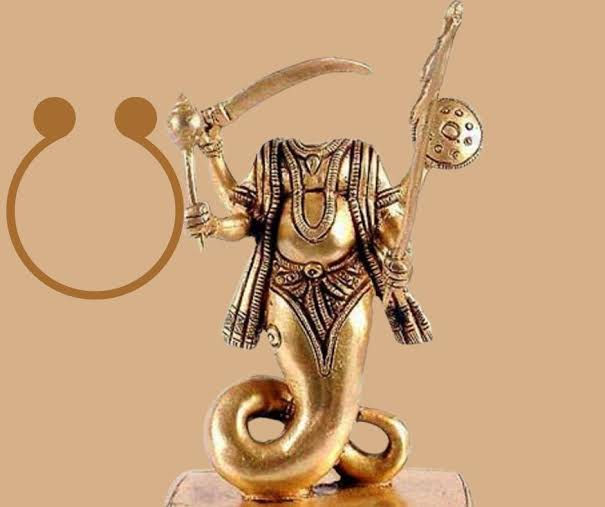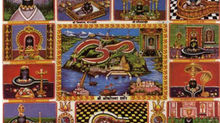
Ketu in Mundane Astrology
- Nov 30, 2024
- 3 min read
Ketu, often referred to as the South Node of the Moon in Vedic astrology, holds a significant role in mundane or global astrology. Its influence is deeply associated with transformation, destruction, and hidden forces that shape human and worldly affairs. Below is an exploration of Ketu’s multifaceted impact on societal and global events.
Destruction and Warfare
Ketu shares characteristics with Mars, particularly in its aggressive and destructive tendencies. In mundane astrology, it is a karaka (significator) of war, rebellion, and destruction. Ketu governs events related to armed conflict, betrayal, and violent upheaval. It is often associated with military engagements, secret conspiracies, and sudden, unexpected victories or defeats on the battlefield. These influences make Ketu a planet that fosters both victory through hidden efforts and downfall through unseen forces.
Conspiracy, Betrayal, and Espionage
Ketu is intricately linked with secret operations, betrayals, and espionage. Unlike Rahu, which is associated with deception and hidden intentions, Ketu governs the revelation of secrets. It represents those who seek to uncover hidden truths, such as spies, whistleblowers, or those involved in intelligence services. Ketu, in this sense, drives individuals and organizations to expose conspiracies or confidential information, often leading to dramatic societal consequences.
Association with Specific Objects and Professions
Ketu is symbolically linked to various objects and industries. It governs cotton, ready-made clothing, timepieces, technology like radio and television, as well as modern gadgets such as computers. Additionally, its influence extends to professions dealing with liquor, drugs, and pharmaceuticals. Due to its connection with technology and time, Ketu is often associated with industries related to innovation and communication.
Reptilian Associations and Hidden Treasures
In Vedic astrology, Ketu is closely associated with the reptilian kingdom, symbolizing creatures like lizards, scorpions, spiders, and hooded snakes. These creatures, often linked with death or transformation in many cultures, mirror Ketu’s nature of poisonous bites or injecting venom, representing metaphorical or literal injections like vaccinations or toxins. This symbolism extends to hidden or underground activities. For instance, Ketu rules treasure hunters, geologists, and explorers of natural resources such as minerals, metals, and oil. In many cultures, snakes are believed to guard hidden treasures, which Ketu symbolically governs.
The Esoteric, Occult, and Ascetic Energies
Ketu is a powerful force in the realm of the occult and esoteric knowledge, governing practices such as hypnotism, telepathy, arcane knowledge, magic, and mysticism. This planet is especially potent in fostering ascetic practices. Those under its influence may seek seclusion, retreating from worldly affairs to engage in spiritual pursuits, often seen in the Aghori sect of India, known for its rituals performed in cremation grounds. This profound connection to the occult also extends to tantric practices and the pursuit of higher spiritual liberation.
Spiritual Liberation and Yoga
Ketu’s role in spirituality is particularly significant, as it represents the ultimate goal of liberation (moksha) from the cycle of birth and rebirth. While Saturn severs worldly attachments, Ketu completely cuts them off, offering the possibility of absolute spiritual liberation. In Vedic astrology, Ketu is deeply tied to the practice of yoga, which aims to dissolve the ego and free the soul from material bondage.
Cultural and Religious Associations
In Indian astrology, Ketu is considered a representative of certain religious groups. For example, Ketu is linked to the Sikh community and its historical revolts, particularly the Sikh revolt in Punjab that occurred during Ketu’s dasha (planetary period). Some astrologers also associate Ketu with Christians and Buddhists, pointing to its influence on ascetic and spiritual traditions within these religions.
Epidemics and Diseases
Ketu’s influence extends to the realm of epidemics and fatal diseases. It is often blamed for causing widespread health crises, such as leprosy, cancer, plague, skin diseases, and other fatal epidemics. These associations reinforce Ketu’s role as a planet of destruction, not only in societal structures but also in physical health, often triggering large-scale health emergencies.
In mundane astrology, Ketu represents forces of destruction, revelation, and transformation, impacting global events through war, conspiracies, espionage, and hidden truths. It governs both material and spiritual realms, from technological advances to esoteric knowledge, and plays a critical role in the unfolding of both societal upheavals and spiritual liberation. Its influence can be seen in events related to armed conflict, health crises, religious revolts, and the exploration of hidden treasures—both literal and metaphorical.
Image source: Internet































Comments